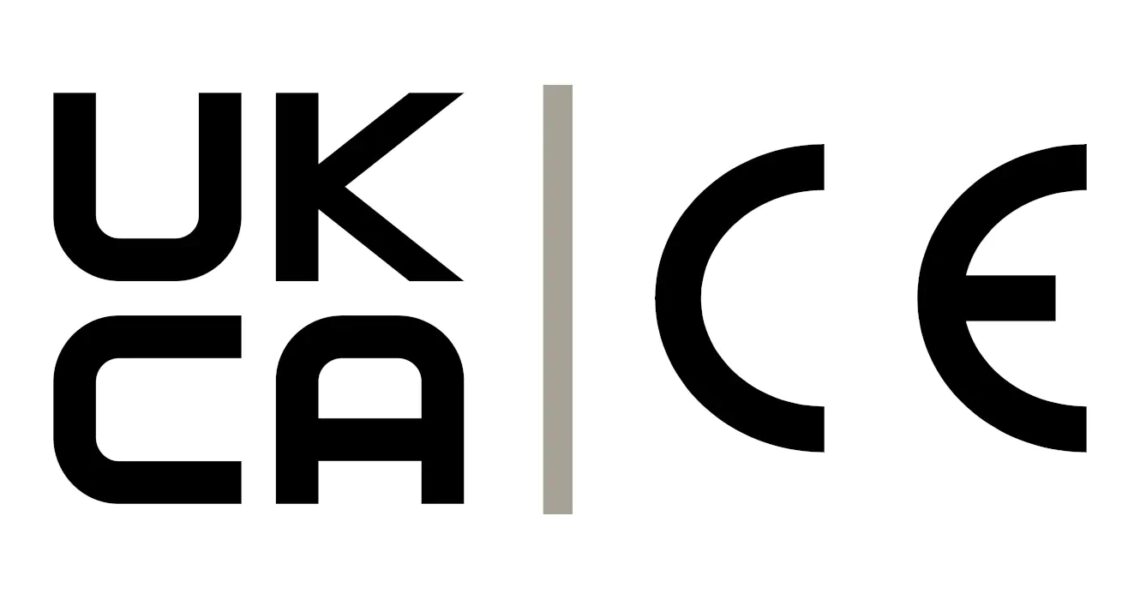Introduction
The UK left the EU single market at 11PM on 31st December 2020. The United Kingdom Conformity Assessed or UKCA mark is being phased in from 1st January 2021 to replace the CE mark in Great Britain (England, Wales, and Scotland). Businesses are encouraged to be ready for full implementation of the new UK regime as soon as possible. However, to allow businesses time to adjust, a transition period is introduced. CE marked goods that meet EU requirements (where these match UK requirements) can continue to be placed on the GB market until 11pm on 31 December 2022. This includes goods which have been assessed by an EU recognised notified body.
The United Kingdom Conformity Assessment (UKCA Mark) is the UK equivalent of the EU CE Marking. This Mark is a valid indicator that a product conforms to relevant UK Regulations. The United kingdom conformity assessment marking is mandatory for products sold in Great Britain post Brexit.
The UKCA will not be recognized in the EU, EEA, or Northern Ireland, and products still require a CE marking for sale in these markets. The manufacturer or their authorised representative will be responsible for affixing the UKCA marking to the product, the same principle as for CE marking but for the UK market.
The UKCA marking cannot be used for products placed on the Northern Ireland market. In Northern Ireland, EU conformity markings continue to be used to show goods meet EU rules. For most manufactured goods, this is the CE marking, but there are some other markings for specific products.
If you are using a UK body to carry out mandatory third-party conformity assessment you also need to apply a UKNI marking. You never apply the UKNI marking on its own – it always accompanies an EU conformity marking.
The difference between UKCA and CE marking is administrative. It reflects that UKCA requires information in English, and UK Approved Bodies are authorised to issue UKCA mark certificates compared to Notified Bodies earlier. The product scope, technical requirements (essential requirements, standards), and conformity assessment procedures will all be alike.
Product areas covered by the UKCA marking
According to BEIS latest guidance, you will need to use the UKCA marking if you manufacture or handle products intended for the British market in the following areas:
- toys
- pyrotechnics
- recreational craft and personal watercraft
- simple pressure vessels
- electromagnetic compatibility
- non-automatic weighing instruments
- measuring instruments
- measuring container bottles
- lifts
- equipment for potentially explosive atmospheres (UKEX)
- radio equipment
- pressure equipment
- personal protective equipment (PPE)
- gas appliances
- machinery
- equipment for use outdoors
- ecodesign
- aerosols
- low voltage electrical equipment
The UKCA marking applies to most products previously subject to the CE marking. It also applies to aerosol products that previously required the reverse epsilon marking. The technical requirements (sometimes referred to as ‘essential requirements’) for the UKCA marking will depend on the product specific legislation.
Business response to the UKCA marking implementation
Trade bodies and entrepreneurs have blamed the decision to stop accepting the European Union’s CE mark and instead create a new UK Conformity Assessed (UKCA) mark. For most of the UK businesses, the new UKCA marking system will mean that a manufacturer will need to pass one set of tests for the EU and another for the UK. This creates extra layers of red tape and some products cannot yet be tested because the UK has no facilities.
Between September and November 2021, the Medicines and Healthcare products Regulatory Agency (MHRA) consulted on proposed changes to the regulatory framework for medical devices in the United Kingdom.
The medical devices industry has pointed out contention with the initial UK plans about the need to get devices re-authorised with a UKCA mark (which replaces the EU ‘CE’ mark certifying that a manufactured good meets the necessary standards). It insisted, the marks represent virtually identical standards and so the need to replace CE with UKCA creates a more bureaucratic process for manufacturers, despite no substantive change.
The Medicines and Healthcare products Regulatory Agency announced that in an attempt to address the industry’s concerns and aiming to avoid unnecessary disruptions, it introduced a delay of the new regulation on UKCA Marking until July 2024 for medical products.
MHRA’s delay would be helpful, but the uncertainty was already causing serious problems. People are not seeing the UK or the EU as a place to innovate and bring new products to market, as they are looking at other jurisdictions.
According to a survey of the Association of British HealthTech Industries Regulatory (ABHI), uncertainty is threatening to damage growth opportunities for the UK HealthTech sector. ABHI members believe that:
- One in five products are expected to be removed from the market over the next five years and one in ten companies are halting all innovation activity.
- 67% of the HealthTech industry expects a delay in bringing innovation to the UK, rising to 86% in those manufacturing in vitro diagnostic medical devices.
- 90% of companies have seen their regulatory costs increase over the last 12 months, and for 20% the increase has been by over 50%.
In June 2022, the British Chambers of Commerce (BCC) joined the other businesses in expressing its concerns on more uncertainty arising from the government’s decision to allow CE-marked products in Northern Ireland, which has no trade barriers with the EU.
Uncertainties also still exist in terms of what will happen to markings in Northern Ireland. The current arrangements also suggest that CE-only marked goods, brought over from Northern Ireland, could continue to be placed on the market in Great Britain, whereas those from the rest of the world could not, beyond the end of 2025. There is some way to go before businesses will have complete assurance about the operation of the new markings systems.
Further the BCC shares the view that usage of EU certificates will cut duplicate testing costs, which firms could have faced early next year to place goods on the market in Great Britain. Those companies, which have the resources to do so, will also have the flexibility of importing CE-marked goods before the end of the year and placing these on the market in Great Britain without subsequent relabelling. BCC called upon the UK government to facilitate goods being able to have UKCA marking, and importer details added via a sticky label, or accompanying paperwork, until 31 December 2025.
At the end of October 2022, the Construction Leadership Council (CLC), representing the building industry, wrote a letter to new business secretary Grant Shapps and new housing secretary Michael Gove, warning them that plans for new homes, schools and hospitals were being affected.
The CLC voiced its “initial concern” on the decision to move from CE to UKCA marking. It has called on the secretaries of state to suspend the implementation of UKCA marking for another two years, as the UKCA mark and transition arrangements from CE remains unclear and the UK testing capacity has not been able to scale up to meet the demands.
The CLC called upon the UK government that given the current business environment of significant material inflation, increased energy costs and uncertainty, urgent action and intervention is required to assist the construction sector to remain resilient and deliver upon the current and future needs of the UK.
“Approximately 28% of products are imported, and half of [those] from the EU, and therefore these products are also affected,” the letter states. “As a result, many global manufacturers now regard the UK as just too difficult to do business with, which has resulted in products being withdrawn – impacting on the UK’s ability to deliver completed projects.”
This situation is affecting inward investment and innovation. Products are under continuous development and, from the turn of the year, if any product is substantially changed or upgraded, then it will need recertification. “We’ve got one testing facility in the UK [for] radiators. And they’ve done an analysis on the amount of radiators that they put through their system. If they have to retest all of them, it would take 75 years.” The Guardian reported that the UK government has delayed compulsory UKCA markings for electrical products like iPhones, so CE markings can still be used until 2025.
Reality check
At technical level, the requirements of the UKCA and CE marking frameworks share many similarities. For example, they both require a technical file, a declaration of conformity, and traceability labelling information.
Importers or manufacturers that are required to comply with the UKCA or CE marking regulations might need to arrange testing for their products, which are often based on the same standards, such as EN standards.
In a globalised world, to avoid disruptions, there is an increased need for harmonisation of regulations and mutual recognition.
Lat’e take the example of Switzerland, a non-EU member country, with a highly competitive economy and policies that are an attractive aspect for many foreign investors. When it comes to marking, Switzerland has signed Mutual Recognition Agreements (MRAs) with the EU. The MRAs between Switzerland and the EU cover the harmonisation between the Swiss and the EU requirements for products under the agreement. This means that the conformity assessment procedure can be carried out according to EU requirements and performed by an EU conformity assessment body recognized under the agreement, or vice-versa.
The MRAs between Switzerland and the EU cover product categories such as:
- Machinery
- Medical devices
- Electrical equipment
- Construction products
- Lifts
- Biocidal products
As an example, importers and manufacturers of radio devices are required to either comply with the Swiss conformity mark (CH Mark) framework or with the CE marking framework.
However, for products where the Swiss and EU legislations are not harmonised, such as hot water boilers or measuring instruments, the products must be manufactured according to Swiss requirements when being imported or manufactured in Switzerland.
Now let’s go back to the UK, where Brexit was done, among other things, to simplify the rules of doing business and trading globally. Volatile pricing and availability of materials, accompanied by widespread disruption to global supply chains are just a few of the challenges faced by many UK businesses post-Brexit.
A 28-minute film produced by senior FT writers and British business people which examines how Brexit has impacted the UK economy has been viewed almost 2.4 million times in six days. The film looks at the political conspiracy of silence, and seeks to explain why there has not yet been a convincing case for a ‘Brexit dividend’.
One in five small UK exporters are unable to trade with the EU because of barriers created by Brexit, according to the British Chambers of Commerce (BCC). The survey also revealed that businesses are in the dark about promised new trade deals with the rest of the world – despite ministers claiming that these are a priority. The group is calling for action to cut customs delays and reduce other barriers to trade, and to make it easier to recruit much-needed workers.
British inventions are being marketed overseas because of new Brexit safety certification rules mean they can’t be sold in the UK. Sky News reports that 22 UK-based scientists have decided to leave Britain rather than lose their EU research funding, as uncertainty continues around the future of Research and Development (R&D) support post-Brexit. Scientists and engineers say the UK’s position as a world leader in research is at risk from “significant brain drain” amid doubts about what will replace funding after negotiations with the EU stalled.
According to the Times, then Brexit opportunities Minister, Jacob Rees-Mogg, was planning to introduce ‘sunset clauses’ for up to 1,500 pieces of retained EU legislation as part of the forthcoming ‘Brexit Freedoms’ Bill. This would impose a five-year ‘expiry date’ on said rules, by which point ministers would have to decide whether to keep, amend or remove them.
This will also mean a raft of looming deadlines in five years’ time, as businesses rush to adapt to new regulatory requirements for everything from chemicals, to hoovers, to packaging. Experience from the new UKCA and UK REACH regimes – for manufactured goods and chemicals respectively – shows that adaptation is a slow and laborious process as regulators must help business get swathes of goods re-authorised for the new regimes. The UK Chemical industry has warned that to duplicate the REACH database on chemical products by the end of 2025, it will cost £1bn.
It also has implications for the UK’s trade. The government says it wants to simplify life for business by amending EU rules with high compliance costs. But the reality is that even simplified UK rules would lead to UK exporters to the EU having to comply with two parallel sets of UK and EU regulations, rather than one common framework.
This leaves three options for such businesses: comply with two regimes at once (increasing overall bureaucracy); stop selling to the EU (harming the UK economy); or remain aligned to EU standards to maintain market access (rendering the UK regulation largely ineffectual).
Consumers will also feel effects. The government will face a choice of whether to make its new regulations optional or obligatory for goods imported from abroad. In the case of the former, companies might stop importing certain goods to the UK because they prioritise compliance with EU regulations – even if they are more stringent – so they can access the larger EU single market.
It would also put UK exporters at a competitive disadvantage, as their international counterparts would have unencumbered access to the UK market while UK exporters still have to contend with others’ regulations.
This new legislation will also reshape the future of the Union. The governments in Edinburgh and Cardiff also have an expressed preference for continued alignment with EU rules. The sunset clauses will cover areas where policy is devolved and/or Northern Ireland remains aligned to EU standards under the Protocol. Northern Ireland having to follow new EU regulations which Great Britain does not has already caused some significant trade disruption. If the UK wants to minimise trade disruption at both the GB-EU border and also at the GB-NI one, it needs to timely identify EU rule changes coming into force and work out how to respond to them. The British firms repeatedly warned the government of the high cost of implementing UKCA, and overwhelmingly supported the possibility of keeping the EU standard.
Conclusion
One of the major stated objectives of Brexit was to reduce the cost of excessive regulation and bureaucratic procedures. The current uncertainties about the replacement of the CE mark by the UK Conformity Assessed (UKCA) marking for goods show that the UK government is increasing bureaucracy and costs and creating a barrier to free international trade and investments.
Currently the UK standards are retained from EU law. Obtaining the new certification is at the moment merely a costly bureaucratic exercise, duplicating current regulations. In practice, the introduction of the UKCA marking resulted in artificially forcing UK manufacturers to get a range of goods re-approved for a UKCA mark, despite UKCA and CE marks covering virtually the same range of products and regulatory standards.
The new UKCA marking has created a huge backlog as manufacturers rushed to get their products UKCA-marked in time, which prompted the UK government to delay and even further postpone the deadline for the medical devices and some other critical products. More importantly, there remain high uncertainties and concerns that UK supply chains will lose access to key component parts from the EU, if European manufacturers do not wish to get UKCA mark for their products
The UK government should listen to the business, including Tratos, and not underestimate the associated costs of introducing new UK-specific regulatory architectures, which demand entire industries to make sudden and wholesale shifts to comply with new standards. As a general rule, introducing new standards is a lengthy process that requires additional and adequate human resources, technical and testing capacities.
It is in the interest of manufacturers to follow a single standard when trading in several countries. Having common rules and standards is essential for international trade to flow. They make businesses feel more confident while dealing with their international partners, while ensuring consumers remain confident that the products they buy are safe and produced in an environment-friendly way.
Having common rules and standards also ensure firms compete on a level-playing field. As it appears the UK does not seem to seek any specific change to the actual regulations, why not listen to the British businesses and continue to recognise the CE mark?










